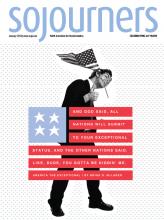ROLAND EMMERICH is known for making the kind of disaster movies that fans of quality filmmaking—the kind with literate scripts, acting that’s not just phoning it in for a Mulholland Drive mortgage payment, and values that approach the humane—love to hate. His films also garner massive audiences. Ask yourself what you were doing on the weekends that Independence Day and Godzilla were released and you may know why.
But look beneath the surface and there’s a more thoughtful sensibility at work. The Day After Tomorrow engaged climate change without easy solutions, and 2012 proposed that salvation for the U.S. will only come from accepting its interdependence with other nations. Emmerich is German, and it’s obvious that his outsider status permits him to raise an eyebrow at cinematic U.S. imperialism.
It’s refreshing to see him turn the eye beneath that brow to a European story in Anonymous, a fantasy that purports to be about whether or not Shakespeare really wrote his plays. Emmerich is having smart fun and so are we. The film takes the debatable authorship theory at face value, so don’t expect a credible laying out of the evidence. What you get instead is a fascinating hybrid movie: a cloak-and-dagger-historical fiction-Greek tragedy-inspirational comedy about how storytellers can change society. It’s bombastic and implausible and full of bad Elizabethan teeth and people who would only say “thou” and “thee” given half the chance. But in its imagining of the power of art to create a new way of thinking about the world, Anonymous ends up being the inversion of the disaster movie: It’s a glorious—if slightly ridiculous—evocation of the artist’s vocation to tell the truth whatever it costs.
Read the Full Article
